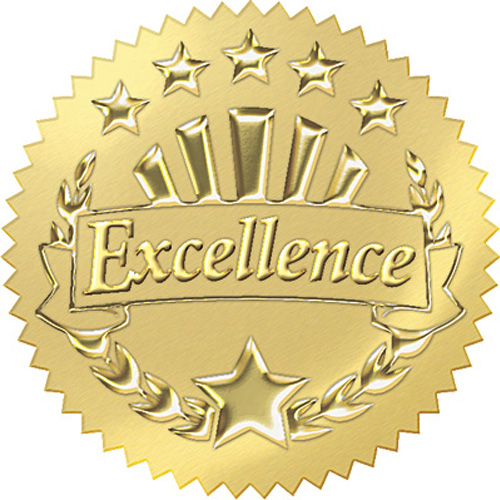 For every leader of an organization that seeks a higher level, accomplishing significant milestones can be a powerfully reaffirming process. Team members or groups selected for achievements draw an understandably renewed and deepened intrinsic value and worth to the organization; and purpose to the organization’s mission.
For every leader of an organization that seeks a higher level, accomplishing significant milestones can be a powerfully reaffirming process. Team members or groups selected for achievements draw an understandably renewed and deepened intrinsic value and worth to the organization; and purpose to the organization’s mission.As we know, these achievements can be measured and memorialized in several ways. They may be the result of a solicited or fully independent benchmarking effort. Or, the organization may have attained one or more industry-specific thresholds of performance that have over time remained respected indices of the most successful teams in that line of work, be it in products or services.
But the core value—in terms of currency within and on behalf of the organization—could be a more lasting asset when effectively facilitated and featured by the leader through the role and performance of each of the team members.
When we consider the intended and unintended responses that receiving an award brings, we know that there is an immediate reaction of excitement and esteem among the group. But how do we utilize that honor into a more lasting form that the organization can use to strive toward future successes?
My experiences suggest that the most effective leaders who first and foremost artfully facilitate the impact of significant achievement or recognition has actually maintained an open and active engagement with each member of the team during the entire performance process. When the leader discovers that his organization is being considered for an award, she can at the earliest stages provide visioning conversations with team members.
These conversations produce confidence and reinforce the goal to be accomplished. They also help to illustrate the concepts of a sustained contribution to the work and to seeking a culture of excellence (a process) over perfection (an event).
This is an important element for our colleagues—regardless of the profession you may be within. Our co-workers must understand the purpose as well as the project; they must believe in the vision and their vocation; and they must be supported to act confidently when momentum exceeds their motivation or group morale. Leaders who achieve this early achieve it often—even when new goals are born.
Those same highly effective leaders who have successfully brought their teams to a special level of success, recognition and performance also immediately represent the award as a dynamic point of reference and not as a static place in time in the history of the company.
For example, a sales team that exceeds all other groups in a particular industry will rightly take a moment to enjoy and savor the process that led from vision to goal, to strategy, to implementation, and ultimately to achievement. Yet the leader will immediately reposition the achievement as the new standard for the group and organization and by doing so, will reposition a new paradigm among each team member for themselves and their roles.
In his landmark text, Zen and the Art of Motorcycle Maintenance, Robert Pirsig spends considerable time exploring and pursuing the concept of a definition of quality, and whether it can be measured. The idea of high quality and high performance being roughly the same thing could actually be accurate—if we continued to accept awards as lagging indicators instead of strong evidence of what to expect for the future.
For the leader of the perpetually successful group, the acute skill to recognize not only the opportunity to influence organizational momentum but to also concurrently facilitate individual and organizational growth is tantamount to having the most treasured asset in his or her industry in abundant levels. The leader who skillfully raises the performance, pride and professionalism of team members and the team is an asset of the greatest value.
As we look across the physical and cultural landscape of our organizations, has time caused us to subtly shift our view? Have we digressed and look at various distinctions earned in the past as milestones of what we once were? Or, do we see these achievements as evidence of a collective set of asset-skills that we have an opportunity to renew our energy toward a new standard and new level of performance?
This article was originally published at http://www.careersingovernment.com